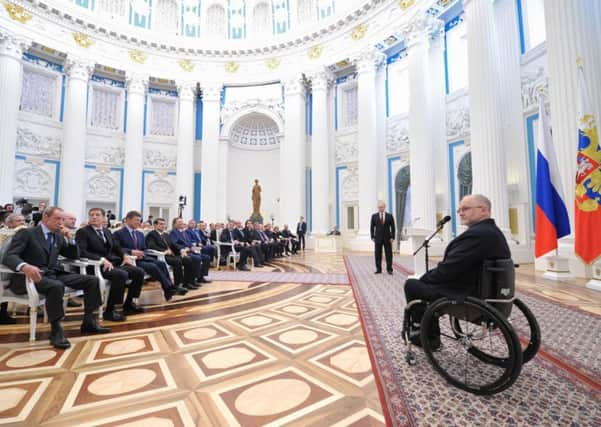Russia to appeal as Paralympics bans team from Rio


The International Paralympic Committee (IPC) had opened suspension proceedings following the McLaren report, which concluded that Russia had operated a state-sponsored doping programme. Yesterday it confirmed the ban.
The Russian Paralympic Committee plans to appeal against the decision to the Court of Arbitration for Sport, the Russian sports minister Vitaly Mutko said.
Advertisement
Hide AdAdvertisement
Hide AdIPC president Sir Philip Craven said: “This is not about athletes cheating the system but the state-run system that is cheating athletes. I believe the Russian system has catastrophically failed its athletes.
“The anti-doping system in Russia is broken, corrupted and entirely compromised.
“The Russian Paralympic Committee are unable to ensure compliance with and enforcement of the IPC anti-doping code and the world anti-doping code within their own national jurisdiction and they can not fulfil its fundamental obligation as an IPC member.
“As a result, the Russian Paralympic Committee is suspended with immediate effect.”
Last week, members of the IPC had met Russian representatives to consider their arguments but it was widely expected the officials would impose the ban.
The Rio Paralympic Games start on 7 September.
The British Paralympic Association last night said it welcomed the decision to ban Russia.
A spokesman said: ‘While we have real sympathy for individual Russian Paralympians not going to Rio who train and compete clean, it is crucial for the integrity of our sport those involved as well as the public feel confident all necessary measures are in place to tackle doping and the playing field is level.”
Despite widespread calls for a blanket ban from the World Anti-Doping Agency and its national counterparts, the International Olympic Committee (IOC) instead left it up to international sporting federations to decide if Russians could compete.
Advertisement
Hide AdAdvertisement
Hide AdRussian athletes have already made it on to the Olympic Games’ medal table. Its first Rio champion suggested his win would help to lift the gloom from the country’s doping scandal.
Beslan Mudranov, who won gold on Saturday in the men’s 60kg judo, said he was “really pleased I could get a gold … because everyone knows what kind of situation we had in Russia before the Olympics”.
After Russia’s team lost more than 100 athletes over its doping scandals, Mr Mudranov said that, besides him, “many [Russian] athletes who could also have won gold, many of them weren’t let in”.
The IOC was widely criticised for ignoring the World Anti-Doping Agency recommendation to ban Russia from the Rio Games.
Instead, each individual sporting federation was given the power to decide whether Russian competitors were clean to compete.
A three-person IOC panel then had the final say and 271 Russian athletes – two-thirds of the original team put forward – were cleared to compete.
The McLaren report, which was published last month, claimed Russia had operated a state-sponsored doping programme and revealed corruption and collusion of government ministers and secret police agents.
Compiled by Canadian lawyer Richard McLaren, it revealed a scheme was operating at the Sochi Winter Olympic Games in 2014, where dirty urine samples were replaced with clean ones through a “mouse hole” in the wall of a laboratory.
Advertisement
Hide AdAdvertisement
Hide AdThe report had looked into claims made by Grigory Rodchenkov, the former head of Russia’s national anti-doping laboratory.
He alleged he doped dozens of athletes in the run-up to the 2014 Winter Games with the help of the Russian government, which he said exploited its host status to subvert the drug-testing programme.
Mr Rodchenkov, now living in hiding in the United States, also alleged he doped athletes before the 2012 Olympic Games in London, the 2013 World Athletics Championships in Moscow and the 2015 World Swimming Championships in Kazan, Russia.
Meanwhile, another doping scandal has emerged at this year’s Games after the head of the Kenyan track and field team was caught in an undercover sting offering to tip off athletes over the timing of drugs tests.
Major Michael Rotich was due to lead out his team at the opening ceremony on Friday, but failed to turn up after he was presented with the allegations. He has now returned to Kenya pending an investigation into his conduct.
In a joint investigation, the German broadcaster ARD and the Sunday Times newspaper yesterday revealed how Mr Rotich told undercover reporters he could give athletes 12-hour advance warning of when they would be tested by anti-doping teams, in exchange for a bribe of £10,000.
The track and field head said he was able to give warning of impending tests because he knew the officials responsible for carrying them out and they often contacted him to find out the whereabouts of athletes.
Responding to the allegations, Mr Rotich did not deny what he was filmed saying and said he had gone along with the meeting to expose the fictitious doping under discussion to “protect” his athletes.
Advertisement
Hide AdAdvertisement
Hide AdKenya has more medal contenders in the middle- and long-distance running events in Rio than any other nation.
The East African country is also a favourite as a training destination for teams around the world. It is understood Mr Rotich was filmed boasting about Kenya as a safe place for athletes to take banned performance-enhancing drugs without being caught.
Athletics Kenya is believed to be considering whether to hand the matter to the country’s police to investigate.
The organisation’s spokesman, Evans Bosire, said: “These are very serious allegations … and we cannot have someone of that character managing our team.
“We cannot just sweep it under the carpet.”